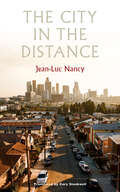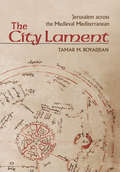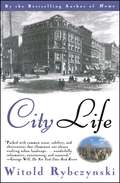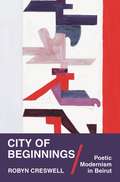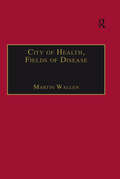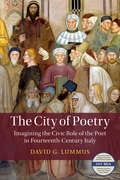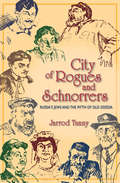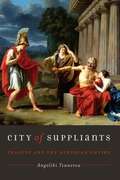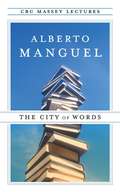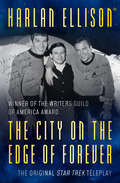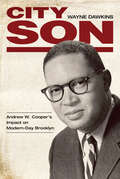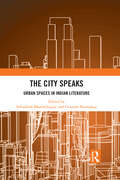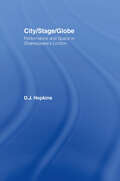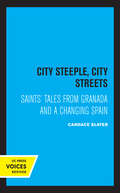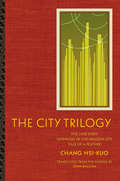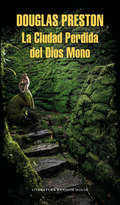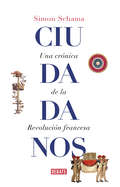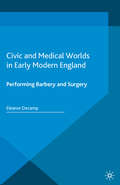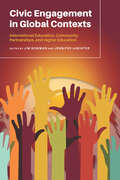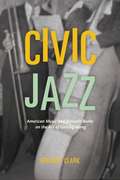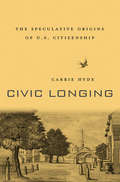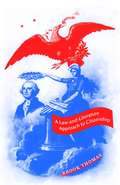- Table View
- List View
The City in the Distance
by Jean-Luc NancyExploring the ever-changing philosophy of city life with Jean-Luc NancyIn The City in the Distance, Jean-Luc Nancy embarks on nothing less than a philosophy of the city. Drawing on his widely discussed accounts of sense and of the fraught question of community, Nancy views the city as the site of a disposition that is constantly undergoing metamorphoses.Far from an abstract account, Nancy attends in the most concrete way possible to the workings of a city not typically taken as paradigmatic, Los Angeles. As Jean-Christophe Bailly suggests in his foreword, Nancy joins Walter Benjamin in thinking the city not from an external vantage point, but on its own terms.
The City Lament: Jerusalem across the Medieval Mediterranean
by Tamar M. BoyadjianPoetic elegies for lost or fallen cities are seemingly as old as cities themselves. In the Judeo-Christian tradition, this genre finds its purest expression in the book of Lamentations, which mourns the destruction of Jerusalem; in Arabic, this genre is known as the ritha al-mudun. In The City Lament, Tamar M. Boyadjian traces the trajectory of the genre across the Mediterranean world during the period commonly referred to as the early Crusades (1095–1191), focusing on elegies and other expressions of loss that address the spiritual and strategic objective of those wars: Jerusalem. Through readings of city laments in English, French, Latin, Arabic, and Armenian literary traditions, Boyadjian challenges hegemonic and entrenched approaches to the study of medieval literature and the Crusades.The City Lament exposes significant literary intersections between Latin Christendom, the Islamic caliphates of the Middle East, and the Armenian kingdom of Cilicia, arguing for shared poetic and rhetorical modes. Reframing our understanding of literary sources produced across the medieval Mediterranean from an antagonistic, orientalist model to an analogous one, Boyadjian demonstrates how lamentations about the loss of Jerusalem, whether to Muslim or Christian forces, reveal fascinating parallels and rich, cross-cultural exchanges.
City Life: Urban Expectations In A New World
by Witold RybczynskiIn City Life, Witold Rybczynski looks at what we want from cities, how they have evolved, and what accounts for their unique identities. In this vivid description of everything from the early colonial settlements to the advent of the skyscraper to the changes wrought by the automobile, the telephone, the airplane, and telecommuting, Rybczynski reveals how our urban spaces have been shaped by the landscapes and lifestyles of the New World.
City of Beginnings: Poetic Modernism in Beirut (Translation/Transnation #41)
by Robyn CreswellHow poetic modernism shaped Arabic intellectual debates in the twentieth century and beyondCity of Beginnings is an exploration of modernism in Arabic poetry, a movement that emerged in Beirut during the 1950s and became the most influential and controversial Arabic literary development of the twentieth century. Robyn Creswell introduces English-language readers to a poetic movement that will be uncannily familiar—and unsettlingly strange. He also provides an intellectual history of Lebanon during the early Cold War, when Beirut became both a battleground for rival ideologies and the most vital artistic site in the Middle East. Arabic modernism was centered on the legendary magazine Shi‘r (“Poetry”), which sought to put Arabic verse on “the map of world literature.” The Beiruti poets—Adonis, Yusuf al-Khal, and Unsi al-Hajj chief among them—translated modernism into Arabic, redefining the very idea of poetry in that literary tradition. City of Beginnings includes analyses of the Arab modernists’ creative encounters with Ezra Pound, Saint-John Perse, and Antonin Artaud, as well as their adaptations of classical literary forms. The book also reveals how the modernists translated concepts of liberal individualism, autonomy, and political freedom into a radical poetics that has shaped Arabic literary and intellectual debate to this day.
City of Health, Fields of Disease: Revolutions in the Poetry, Medicine, and Philosophy of Romanticism (The Nineteenth Century Series)
by Martin WallenThe Romantic Era witnessed a series of conflicts concerning definitions of health and disease. In this book, Martin Wallen discusses those conflicts and the cultural values that drove them. The six chapters progress from the mainstream rejuvenation of the Socratic values by Wordsworth and Coleridge to the radical alternatives offered by the Scottish theorist, John Brown, and the speculative German philosopher, F. W. J. Schelling. Wallen shows how actual definitions of health and disease changed at the turn of the nineteenth century, and provides an analysis of the metaphorical uses to which romantic thinkers put these different definitions in their attempts to value or devalue competing concepts of individuality, poetic expression, and history. Key to the redefinition of these concepts was the use of the rhetoric of medicine to add value to those statements considered desirable and to undermine those targeted for elimination from public discourse. By juxtaposing the well-known critical works of Wordsworth and Coleridge with lesser-known works such as Schelling's Yearbooks of Medicine and Thomas Beddoes' medical treatises, Wallen illuminates the central role medicine played in redefining the human being's relationship to society and nature - part of the cultural revolution that began in the nineteenth century.
The City of Poetry: Imagining the Civic Role of the Poet in Fourteenth-Century Italy (Cambridge Studies in Medieval Literature)
by David LummusWhat did it mean to be a poet in fourteenth-century Italy? What counted as poetry? In an effort to answer these questions, this book examines the careers of four medieval Italian poets (Albertino Mussato, Dante Alighieri, Francesco Petrarch, and Giovanni Boccaccio) who wrote in both Latin and the Italian vernacular. In readings of defenses of poetry, speeches and letters on public laurel-crowning ceremonies, and other theoretical and poetic texts, this book shows how these poets viewed their authorship of poetic works as a function of their engagement in a human community. Each poet represents a model of the poet as a public intellectual - a poet-theologian - who can intervene in public affairs thanks to his authority within texts. The City of Poetry provides a new historicized approach to understanding poetic culture in fourteenth-century Italy which reshapes long-standing Romantic views of poetry as a timeless and sublimely inspired form of discourse.
City of Rogues and Schnorrers: Russia's Jews and the Myth of Old Odessa
by Jarrod Tanny&“Outstanding . . . A delightfully written work of serious scholarship.&” —Jewish Book World Old Odessa, on the Black Sea, gained notoriety as a legendary city of Jewish gangsters and swindlers, a frontier boomtown mythologized for the adventurers, criminals, and merrymakers who flocked there to seek easy wealth and lead lives of debauchery and excess. Odessa is also famed for the brand of Jewish humor brought there in the nineteenth century from the shtetls of Eastern Europe and that flourished throughout Soviet times. From a broad historical perspective, Jarrod Tanny examines the hybrid Judeo-Russian culture that emerged in Odessa in the nineteenth century and persisted through the Soviet era and beyond. The book shows how the art of eminent Soviet-era figures such as Isaac Babel, Il&’ia Ilf, Evgenii Petrov, and Leonid Utesov grew out of the Odessa Russian-Jewish culture into which they were born and which shaped their lives. &“Traces the emergence, development, and persistence of the myth of Odessa as both Garden of Eden and Gomorrah . . . A joy to read.&” —Robert Weinberg, Swarthmore College
City of Suppliants: Tragedy and the Athenian Empire
by Angeliki TzanetouAfter fending off Persia in the fifth century BCE, Athens assumed a leadership position in the Aegean world. Initially it led the Delian League, a military alliance against the Persians, but eventually the league evolved into an empire with Athens in control and exacting tribute from its former allies. Athenians justified this subjection of their allies by emphasizing their fairness and benevolence towards them, which gave Athens the moral right to lead. But Athenians also believed that the strong rule over the weak and that dominating others allowed them to maintain their own freedom. These conflicting views about Athens' imperial rule found expression in the theater, and this book probes how the three major playwrights dramatized Athenian imperial ideology. Through close readings of Aeschylus' Eumenides, Euripides' Children of Heracles, and Sophocles' Oedipus at Colonus, as well as other suppliant dramas, Angeliki Tzanetou argues that Athenian tragedy performed an important ideological function by representing Athens as a benevolent and moral ruler that treated foreign suppliants compassionately. She shows how memorable and disenfranchised figures of tragedy, such as Orestes and Oedipus, or the homeless and tyrant-pursued children of Heracles were generously incorporated into the public body of Athens, thus reinforcing Athenians' sense of their civic magnanimity. This fresh reading of the Athenian suppliant plays deepens our understanding of how Athenians understood their political hegemony and reveals how core Athenian values such as justice, freedom, piety, and respect for the laws intersected with imperial ideology.
The City of Words (The CBC Massey Lectures)
by Alberto ManguelIn the 2007 CBC Massey Lectures, Alberto Manguel leads us back into our literary tradition to find insight about one of the most contentious issues of our time: the rise of ethnic nationalism. The end of ethnic nationalism -- building societies around sets of common values -- seems like a good idea. But something is going wrong. Manguel suggests we should look at what stories have to teach us about society. With wit and erudition, Manguel looks at what visionaries, poets, novelists, essayists, and filmmakers have to say about building societies. From Cassandra to Jack London, the Epic of Gilgamesh to the computer Hal in 2001: A Space Odyssey, Don Quixote to Atanarjuat: The Fast Runner, Manguel draws fascinating and revelatory parallels between the personal and political realities of our present-day world and those of myth, legend, and story.
The City on the Edge of Forever: The Original Teleplay
by Harlan EllisonThe original teleplay that became the classic Star Trek episode, with an expanded introductory essay by Harlan Ellison, The City on the Edge of Forever has been surrounded by controversy since the airing of an "eviscerated" version--which subsequently has been voted the most beloved episode in the series' history. In its original form, The City on the Edge of Forever won the 1966-67 Writers Guild of America Award for best teleplay. As aired, it won the 1967 Hugo Award. The City on the Edge of Forever is, at its most basic, a poignant love story. Ellison takes the reader on a breathtaking trip through space and time, from the future, all the way back to 1930s America. In this harrowing journey, Kirk and Spock race to apprehend a renegade criminal and restore the order of the universe. It is here that Kirk faces his ultimate dilemma: a choice between the universe--or his one true love. This edition makes available the astonishing teleplay as Ellison intended it to be aired. The author's introductory essay reveals all of the details of what Ellison describes as a "fatally inept treatment" of his creative work. Was he unjustly edited, unjustly accused, and unjustly treated?
City Son: Andrew W. Cooper's Impact on Modern-Day Brooklyn (Margaret Walker Alexander Series in African American Studies)
by Wayne DawkinsIn 1966, a year after the Voting Rights Act began liberating millions of southern blacks, New Yorkers challenged a political system that weakened their voting power. Andrew W. Cooper (1927–2002), a beer company employee, sued state officials in a case called Cooper vs. Power. In 1968, the courts agreed that black citizens were denied the right to elect an authentic representative of their community. The 12th Congressional District was redrawn. Shirley Chisholm, a member of Cooper's political club, ran for the new seat and made history as the first black woman elected to Congress. Cooper became a journalist, a political columnist, then founder of Trans Urban News Service and the City Sun, a feisty Brooklyn-based weekly that published from 1984 to 1996. Whether the stories were about Mayor Koch or Rev. Al Sharpton, Howard Beach or Crown Heights, Tawana Brawley's dubious rape allegations, the Daily News Four trial, or Spike Lee's filmmaking career, Cooper's City Sun commanded attention and moved officials and readers to action. Cooper's leadership also gave Brooklyn—particularly predominantly black central Brooklyn—an identity. It is no accident that in the twenty-first century the borough crackles with energy. Cooper fought tirelessly for the community's vitality when it was virtually abandoned by the civic and business establishments in the mid-to-late twentieth century. In addition, scores of journalists trained by Cooper are keeping his spirit alive.
The City Speaks: Urban Spaces in Indian Literature
by Subashish Bhattacharjee Goutam KarmakarThis book studies the significance and representation of the ‘city’ in the writings of Indian poets, graphic novelists, and dramatists. It demonstrates how cities give birth to social images, perspectives, and complexities, and explores the ways in which cities and the characters in Indian literature coexist to form a larger literary framework of interpretations. Drawing on the theoretical concepts of Western urban thinkers such as Henri Lefebvre, Georg Simmel, Walter Benjamin, Edward Soja, David Harvey, and Diane Levy, as well as South Asian thinkers such as Ashis Nandy, Arjun Appadurai, Vinay Lal, and Ravi Sundaram, the book projects against a seemingly monolithic and homogenous Western qualification of urban literatures and offers a truly unique and contentious presentation of Indian literature. Unfolding the urban-literary landscape of India, the volume lays the groundwork for an urban studies approach to Indian literature. It will be of great interest to scholars and students of literature, especially Indian writing in English, urban studies, and South Asian studies.
City/Stage/Globe: Performance and Space in Shakespeare's London (Literary Criticism and Cultural Theory)
by D.J. HopkinsThis interdisciplinary study theorizes the interaction of individual performance and social space. Examining three categories of space – the urban, the theatrical, and the cartographic – this volume considers the role of performance in the production and operation of these spaces during a period in London’s history defined roughly by the life of Shakespeare. City/Stage/Globe not only organizes a selection of plays, pageants, maps, and masques in the historical and cultural contexts in which they emerged, but also uses performance theory to locate the ways in which these seemingly ephemeral events contributed to lasting change in the spatial concepts and physical topograpy of early modern London.
City Steeple, City Streets: Saints' Tales from Granada and a Changing Spain
by Candace SlaterCandace Slater's new book focuses on narratives concerning Fray Leopoldo de Alpandeire (1864-1956), a Capuchin friar from Granada and probably the most popular nonconsecrated saint today in all of Spain. In tracing the emergence of a group of contemporary legends about Fray Leopoldo, Slater discusses both the stories she tape-recorded in the streets of Granada and the friar's official biography. She underscores the essential pluralism of the tales, their undercurrent of resistance to institutional authority, and their deep concern for the relationship between past and present. Bearing witness to the subtlety and resilience of even the most apparently conservative folk-literary forms, these stories are not only about the role of saints and miracles in an increasingly secular and industrial society but, first and foremost, also about the legacy of the Franco years. This title is part of UC Press's Voices Revived program, which commemorates University of California Press's mission to seek out and cultivate the brightest minds and give them voice, reach, and impact. Drawing on a backlist dating to 1893, Voices Revived makes high-quality, peer-reviewed scholarship accessible once again using print-on-demand technology. This title was originally published in 1990.
The City Trilogy: Five Jade Disks, Defenders of the Dragon City, and Tale of a Feather
by John Balcom Chang Chsi-KuoTaiwan's most innovative science fiction writer presents three tales of intrigue, espionage, betrayal, political strife, time travel, and Chinese history and mysticism.
The City Trilogy: Five Jade Disks, Defenders of the Dragon City, and Tale of a Feather (Modern Chinese Literature from Taiwan)
by Hsi-kuo ChangTaiwan's most innovative science fiction writer presents three tales of intrigue, espionage, betrayal, political strife, time travel, and Chinese history and mysticism. After thousands of years of civil unrest and countless wars, the weary Huhui people of Sunlon City have once again succumbed to a ruthless and overpowering enemy. In Five Jade Disks, the first book in the trilogy, the imperialistic Shan have enslaved the inhabitants of Sunlon City and imposed a harsh martial order. As the Shan fight to retain control of the restless Huhui natives, an unstable rebel alliance prepares to win back its homeland. Amidst the confusion of revolt, Miss Qi, a determined young girl, emerges as an unlikely leader. With the help of her friends and the loyal Green Snake Brotherhood, Miss Qi discovers that an ancient cult and its insidious and unusually powerful leader may hold the key to the rebels' victory—or may yet be the cause of their undoing. As she rushes to put the pieces together, the rebels, divided by internal factions, strive to band together in a heroic attempt to overthrow the Shan. The story continues in Defenders of the Dragon City. The Shan have been defeated, but the victory celebrations of the Huhui are quickly brought to an end. After deserting Sunlon City, the Shan regroup and return for one final and bitter attempt to destroy the weakened rebel forces. During their exile, the Shan turn their aggressions against the indigenous races of the Huhui planet, a colorful mix of peaceful tribes resembling serpents, eagles, and leopards. Forced into the war to save their remaining territory, the indigenous peoples join the Huhui in their continuing struggle against the Shan.The third novel, Tale of a Feather, opens with images of chaos and devastation. The conflict with the Shan has left the city in flames, and refugees are fleeing in droves through the main gates. Taking advantage of the turmoil, a ruthless dictator assumes control of the weak interim government and begins a treacherous campaign to eliminate his adversaries. In this volatile atmosphere, Miss Qi continues her desperate search to discover the origin of the mysterious Bronze Statue Cult and come to terms with the dark power it wields over her people.The trilogy, first published in Taiwan in the late 1980s and early 1990s and widely considered to be a modern classic, is now presented for the first time in English and in a single volume. In these allegorical tales, Chang confronts some of the most serious and divisive issues of our time, including the burden of history and the ravages of oppression, racism, and ethnic displacement.
La Ciudad Perdida del Dios Mono
by Douglas PrestonUna leyenda de 500 años. Una maldición antigua. Un asombroso misterio médico. Y un viaje de descubrimiento al corazón ignoto de la selva más densa del mundo. Desde los días de Hernán Cortés han circulado rumores sobre una ciudad perdida con inmensas riquezas escondida en alguna parte de Honduras, llamada la Ciudad Blanca o la Ciudad Perdida del Dios Mono. Los pueblos indígenas hablan de ancestros que huyeron a ese lugar para escapar de los conquistadores españoles, y advierten que cualquiera que entre a esta ciudad sagrada enfermará y morirá. En 1940, el periodista estadounidense Theodore Morde regresó de la selva con cientos de objetos antiguos, asegurando haber encontrado la Ciudad Blanca. Sin embargo, se suicidó sin revelar su ubicación. Tres cuartos de siglo después, el escritor Douglas Preston se unió a un equipo de exploradores en una nueva aventura. A bordo de un viejo avión monomotor, y gracias a un avanzado dispositivo láser, descubrieron la imagen inconfundible de una metrópoli entre el denso follaje selvático. Aventurándose en esta tierra salvaje, Preston y el equipo de investigadores se enfrentaron a lluvias torrenciales, arenas movedizas, insectos portadores de enfermedades, jaguares y serpientes. Sin embargo, no fue sino hasta su regreso que la tragedia los golpeó: Preston y otros descubrieron que habían contraído una terrible enfermedad en las ruinas. Intrigante e impactante, plagada de aventuras estremecedoras y dramáticos giros de tuerca, La Ciudad Perdida del Dios Mono es el recuento verídico de uno de los grandes descubrimientos del siglo XXI.
Ciudadanos: Una crónica de la Revolución francesa
by Simon Schama¿Fue la libertad la causa o el producto de la Revolución francesa? La mejor crónica sobre uno de los periodos estelares de la humanidad. Ciudadanos no es la versión trillada de un régimen muriendo de enfermedad y decrepitud, sino el reflejo de la transformación que cambió la historia de Europa para siempre: el paso de hombres y mujeres de «sujetos» a «ciudadanos». Partiendo de la idea de que la fe de los ciudadanos en la libertad fue la causa más que el producto de la Revolución francesa, Schama dibuja un país en ebullición en el que se derrumban las diferencias entre nobles y plebeyos, en un escenario de hambre, ira, terror y muerte. A través de la historia social, cultural y política, Schama encuentra el marco de su historia en imágenes y artefactos, cerámicas y calendarios y, con su particular punto de vista, nos acerca más que nunca a la realidad humana de la Revolución Francesa. Reseñas:«El mejor libro que he leído sobre la Revolución francesa.»Richard Cobb «Monumental, provocador y refinado. La descripción que hace Schama de los primeros años de la gran Revolución que se apoderó de Francia y de las décadas que la precedieron, son difíciles de superar.»Eugene Weber, The New York Times Book Review «No he leído nada que pueda compararse al épico relato de Schama que tiene la capacidad de sumergir al lector en los años más violentos de ese "fermento universal" que fue la Revolución.»Christopher Hibbert, Sunday Times «Deslumbrante... supera todos los elogios. Schama describe en las páginas de este maravilloso libro las vicisitudes de ese mundo con una comprensión, sabiduría, compasión y verdad inigualables.»Bernard Levin «Schama brinda una imagen sin parangón de las corrientes y contradicciones que conformaron esta terrible secuencia de sucesos.»Antont Beevor, Express «La sabiduría de Schama es la causa del placer y la admiración que provoca la lectura de esta obra. La humanidad de sus veredictos representa un logro formidable, a menudo conmovedor.»George Steiner, The New Yorker «Un brillante tour de force. Este extraordinario libro identifica y transmite la esencia de la Revolución, lo atractivo de su llamada, el secreto de su poder y la razón de su eventual fracaso: la violencia.»Tim Blanning, Independent
Civic and Medical Worlds in Early Modern England: Performing Barbery and Surgery (Early Modern Literature in History)
by E. DecampThrough its rich foray into popular literary culture and medical history, this book investigates representations of regular and irregular medical practice in early modern England. Focusing on the prolific figures of the barber, surgeon and barber-surgeon, the author explores what it meant to the early modern population for a group of practitioners to be associated with both the trade guilds and an emerging professional medical world. The book uncovers the differences and cross-pollinations between barbers and surgeons' practices which play out across the literature: we learn not only about their cultural, civic, medical and occupational histories but also about how we should interpret patterns in language, name choice, performance, materiality, acoustics and semiology in the period. The investigations prompt new readings of Shakespeare, Jonson, Middleton and Beaumont, among others. And with chapters delving into early modern representations of medical instruments, hairiness, bloodletting procedures, waxy or infected ears, wart removals and skeletons, readers will find much of the contribution of this book is in its detail, which brings its subject to life.
Civic Engagement in Global Contexts: International Education, Community Partnerships, and Higher Education
by Jim Bowman Jennifer DeWinterThis volume examines the role of writing, rhetoric, and literacy programs and approaches in the practice of civic engagement in global contexts. Writing programs have experience in civic engagement and service learning projects in their local communities, and their work is central to developing students’ literacy practices. Further, writing programs compel student writers to attend to audience needs and rhetorical exigencies as well as reflect on their own subject positions. Thus, they are particularly situated to partner with other units on college campuses engaged in global partnerships. Civic Engagement in Global Contexts provides examples and evidence of the critical self-reflection and iteration with community partners that make these projects important and valuable. Throughout its thirteen chapters, this collection provides practical pedagogical and administrative approaches for writing studies faculty engaging with global learning projects, as well as nuanced insight into how to navigate contact zones from the planning stages of projects to the hard work of self-reflection and change. Partnerships and projects across national borders compel the field of rhetoric and composition to think through the ethics of writing studies program design and teaching practices. Doing this difficult work can disrupt presumptive notions of ownership that faculty and administrators hold concerning the fields involved in these projects and can even lead to decentering rhetoric/composition and other assumptions held by US-based institutions of higher education. Civic Engagement in GlobalContexts will be useful to instructors, advisors, and project managers of students in faculty-led project learning in overseas settings, international service learning through foreign study programs, and foreign study itself and to faculty members introducing civic engagement and community-based learning projects with foreign students in overseas institutions. Contributors: Olga Aksakalova, James Austin, Maria de Lourdes Caudillo Zambrano, Rebecca Charry Roje, Patricia M. Dyer, Tara E. Friedman, Bruce Horner, Kathryn Johnson Gindlesparger, Adela C. Licona, Ian Mauer, Joyce Meier, Susan V. Meyers, Sadia Mir, Stephen T. Russell
Civic Jazz: American Music and Kenneth Burke on the Art of Getting Along
by Gregory ClarkJazz is born of collaboration, improvisation, and listening. In much the same way, the American democratic experience is rooted in the interaction of individuals. It is these two seemingly disparate, but ultimately thoroughly American, conceits that Gregory Clark examines in Civic Jazz. Melding Kenneth Burke’s concept of rhetorical communication and jazz music’s aesthetic encounters with a rigorous sort of democracy, this book weaves an innovative argument about how individuals can preserve and improve civic life in a democratic culture. Jazz music, Clark argues, demonstrates how this aesthetic rhetoric of identification can bind people together through their shared experience in a common project. While such shared experience does not demand agreement--indeed, it often has an air of competition--it does align people in practical effort and purpose. Similarly, Clark shows, Burke considered Americans inhabitants of a persistently rhetorical situation, in which each must choose constantly to identify with some and separate from others. Thought-provoking and path-breaking, Clark’s harmonic mashup of music and rhetoric will appeal to scholars across disciplines as diverse as political science, performance studies, musicology, and literary criticism.
Civic Jazz: American Music and Kenneth Burke on the Art of Getting Along
by Gregory ClarkJazz is born of collaboration, improvisation, and listening. In much the same way, the American democratic experience is rooted in the interaction of individuals. It is these two seemingly disparate, but ultimately thoroughly American, conceits that Gregory Clark examines in Civic Jazz. Melding Kenneth Burke’s concept of rhetorical communication and jazz music’s aesthetic encounters with a rigorous sort of democracy, this book weaves an innovative argument about how individuals can preserve and improve civic life in a democratic culture. Jazz music, Clark argues, demonstrates how this aesthetic rhetoric of identification can bind people together through their shared experience in a common project. While such shared experience does not demand agreement—indeed, it often has an air of competition—it does align people in practical effort and purpose. Similarly, Clark shows, Burke considered Americans inhabitants of a persistently rhetorical situation, in which each must choose constantly to identify with some and separate from others. Thought-provoking and path-breaking, Clark’s harmonic mashup of music and rhetoric will appeal to scholars across disciplines as diverse as political science, performance studies, musicology, and literary criticism.
Civic Longing: The Speculative Origins of U.S. Citizenship
by Carrie HydeNo Constitutional definition of citizenship existed until the 14th Amendment in 1868. Carrie Hyde looks at the period between the Revolution and the Civil War when the cultural and juridical meaning of citizenship was still up for grabs. She recovers numerous speculative traditions that made and remade citizenship’s meaning in this early period.
Civic Myths
by Brook ThomasAs questions of citizenship generate new debates for this generation of Americans, Brook Thomas argues for revitalizing the role of literature in civic education. Thomas defines civic myths as compelling stories about national origin, membership, and values that are generated by conflicts within the concept of citizenship itself. Selected works of literature, he claims, work on these myths by challenging their terms at the same time that they work with them by relying on the power of narrative to produce compelling new stories.Civic Myths consists of four case studies: Nathaniel Hawthorne's The Scarlet Letter and "the good citizen"; Edward Everett Hale's "The Man without a Country" and "the patriotic citizen"; Mark Twain's Adventures of Huckleberry Finn and "the independent citizen"; and Maxine Hong Kingston's China Men and "the immigrant citizen." Thomas also provides analysis of the civic mythology surrounding Abraham Lincoln and the case of Ex parte Milligan. Engaging current debates about civil society, civil liberties, civil rights, and immigration, Thomas draws on the complexities of law and literature to probe the complexities of U.S. citizenship.
